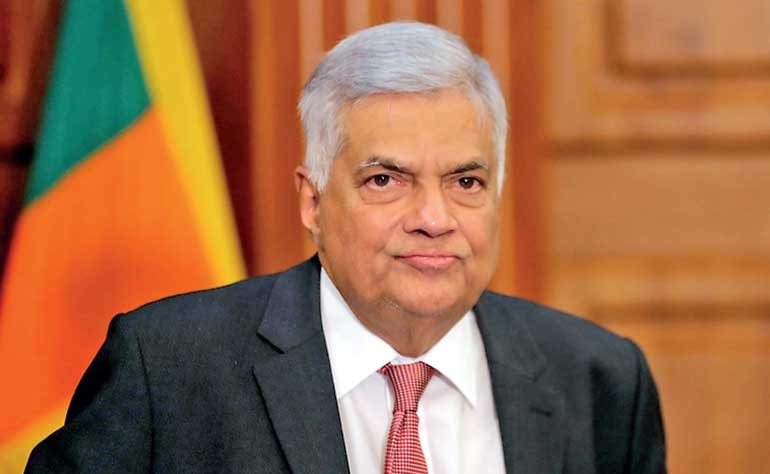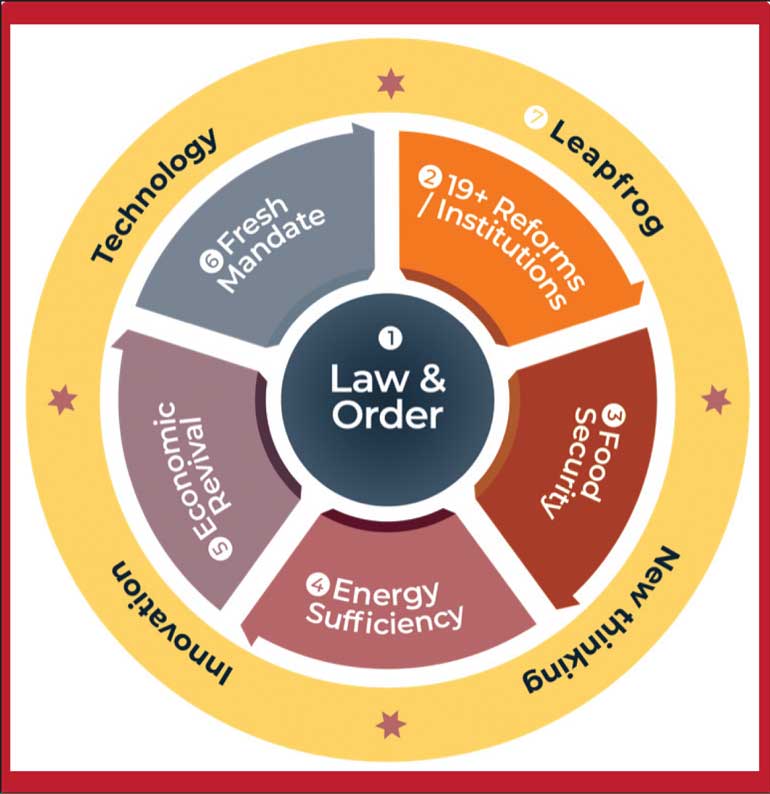Sunday Feb 15, 2026
Sunday Feb 15, 2026
Wednesday, 31 August 2022 00:00 - - {{hitsCtrl.values.hits}}

President Ranil Wickremesinghe
 People, organisations, and countries – all get into trouble at some point of their life – avoidable? May be. At times it’s their own doing but other times, it’s external factors and we are sitting ducks. When problems strike, we go into crisis mode, but we cannot operate in crisis mode forever. We need to start the ‘rebuilding process’, and we need to be clever about it. As someone says, never let a crisis go waste!
People, organisations, and countries – all get into trouble at some point of their life – avoidable? May be. At times it’s their own doing but other times, it’s external factors and we are sitting ducks. When problems strike, we go into crisis mode, but we cannot operate in crisis mode forever. We need to start the ‘rebuilding process’, and we need to be clever about it. As someone says, never let a crisis go waste!
There are so many interpretations and remedies suggested by many advocates for the crisis period. We should analyse the root causes of Sri Lanka’s worst economic disaster to avoid such issues in future, also to hold those responsible for this disaster accountable. During a crisis, while it is common to debate about the origins, I like to focus on the recovery phase, as time is of essence.
We are entering the most important time or phase – crisis recovery. If we don’t handle or navigate this phase cleverly, we may lose a huge opportunity to rebuild, or worse, we may never recover.
A seven-dimensional recovery model
I’d like to propose a seven-dimensional recovery model for Sri Lanka; of course this could be debated, improved, or snowballed to a better one. The idea is to have a simple, yet effective recovery model, that is relatively easy to implement and importantly easy to communicate – in the current state people are in. People are still in crisis mode, tensed, lost, anxious, desperate, and scared, they are not ‘rational’ by any standard and very impulsive and suspicious. We need a lot of clear, repetitive communications (over communicate) with simple ‘proof points’ to take them to a state of trusting, calm and optimistic; well communication is a separate topic for another article.
This model may be in the minds of many, but I wanted to put it into a diagram. Remember – there are phases after recovery, but first is recovery and hence the basics addressed in the model. Let’s touch on the first six dimensions rather briefly (common knowledge) and elaborate more on the seventh dimension.
Dimension 1 – Right in the heart or centre is ‘law and order’ and this we must protect. If this is lost, we lose the foundation to build our recovery plan. We had a window of lost law and order, which was horrific. The basic ‘law and order’ can slowly evolve into ‘discipline’ which we lack most.
Dimension 2 – It’s hard to find any country on the map that destroyed ‘institutions’ and achieved prosperity. In fact, the correlation is that - more you have institutions working, there is growth. This should be the second signal (first is law & order) to the world that Sri Lanka is ready to rebuild. I’m sure there is progress on this front with your leadership on 19++.
Dimension 3 – This is relatively an easy measure as previous infrastructure and systems are ready to kick start. Food security is a big priority and steps are already taken to provide fertiliser and other facilities to correct this, of course like any decision – there is a lead time from decision to results. Meantime, we are depending on support from friendly nations and donors to get through a food scarcity.
Dimension 4 – Energy crisis pivoted around shortages in fuel, cooking gas and electricity. This crippled many industries and created significant impact on lives and the economy. Hopefully we are at the periphery of the crisis, but we need some super plans to build this sector. We need think new, lot of inefficiencies and bad practices.
Dimension 5 – I think there is enough debate about the economic recovery or revival. The debt restructure and involvement of IMF are being discussed, which could reset the balance sheet for a start. But please be consistent with economic policy, which ever it is.
Dimension 6 – People need a fresh mandate. Till this comes along, people will hang on to the residue of this crisis and doubt every decision – hence it’s a part of the recovery plan. People are bitten once (many times of course, but this is a new low) and ready to exercise their mandate with caution. They possibly - yes possibly might think a little bit more whom they could elect and hopefully - yes hopefully we will have a better parliament, who could shoulder the journey. But as time passes, their better judgement could possibly dilute and become impulsive as they have been before, so timing is important (of course when we can afford an election). Having a capable parliament is essential for recovery and post recovery growth.
That is a summary of the 1-6 dimensions in the recovery plan, which are essential and obvious. I want to draw your attention to the most important step (in my view) or what I call the ‘mindset’ to approach this recovery. Let me explain this in detail.
 The seventh sense
The seventh sense
Dimension 7 – The key word here is ‘LEAPFROG’ mindset or the mindset to transform to a better state than we were – it’s possible. We should NOT approach the recovery plan with the same pre-crisis mindset. The goal or objective should not be to get back to where we were (say 2019, pre-Easter attacks, or even 2018, pre-constitutional crisis) but to look at where we want to be in 2030, post our recovery. In other words, how should 2025 look like for Sri Lanka? We need to ‘Reimagine Sri Lanka 2025’.
We need to approach ‘road to recovery’ through an ‘innovators’ mindset. True that some areas will have to get back to what it was, but imagine if we transform some of the areas and come out winning – stronger? And truly become ‘the wonder of Asia’?
We have been critical about many issues, problems, and gaps in our system for as long as we remember. But always there were stronger opposing forces when it came to implementation including political patronage; corruption at many levels, poor tax collections, performance of state-owned enterprises are few examples of a long list. Majority didn’t believe that these issues could bring us to where we are today, until we experienced the crisis – hands on.
In the past, we could not tackle these issues boldly as we wished - as there was resistance and less effective ‘incremental’ plans. Now, people request for a ‘system change’ and you could have the support of the majority for these issues to be dealt directly, as the resistors have become the minority. Again, there is a timing issue here, and need to move swiftly with the reforms, with a ‘game changer – bold moves’ mindset.
We need to have an ‘exponential’ mindset in our ‘road to recovery’! Each of the six areas discussed, can be approached with a fresh perspective. Computing power and technology has grown and continue to grow exponentially. What was not possible few years ago, is possible now with technology, and cost seems to have come down too.
Imagine this
Imagine if defence spend is progressively moved from infantry to intelligence? Infantry is good at the time of war, but to prevent security breaches you need to invest in intelligence and surveillance, this in turn improves, security, law and order, and discipline. This needs a ‘change plan’ to integrate infantry into civil life, so budget can be diverted to better use.
Imagine if we move part of our agriculture to tech assisted agriculture, like example, hydroponics (we already have this in Sri Lanka, but need to scale with support) and not go back 100% to labour intensive, low value crops? Imagine if we could ‘own’ a slice of the emerging vegan food sector, it will be our next big act after tea.
Imagine, we leapfrog to green energy rather than ‘trying’ and to get back to fossil fuels? What if every car that is parked in the sun all day had solar panels fixed, so you can travel ‘home to office’ free? For example, a suitable ‘transportation policy’ should guide the private sector where to invest in the next two years, so that we don’t start importing the same vehicles, when restrictions are lifted. The entire vehicle industry needs guidance and advanced notice to get ready for the green wave.
Imagine we use innovation and technology for economic revival. True that traditional sectors need to kick in and stabilise, but what about our next act? From an FX perspective, each software engineer is like a room in a boutique hotel, that’s the earning potential we have, and they don’t demand a lot, they need basic infrastructure, and they could work from home! The world is going through digital transformation and world needs many of them! They could easily get to $ 12,000 per capital income bracket.
Imagine if we invite Disney to set up in Hambantota (we have a port and an airport) – give even a zillion year tax concession – we will have our neighbours visiting us (among the four, we are the only country that could bring Pakistan, India, and Bangladesh visitors to one place) - we could beat tourism targets by 4x… Bangalore –
Colombo is a half hour flight!
Imagine we connect all 22 million (ok, less the kids below 12 years) into one platform with a smart ID and make it mandatory for anything critical (employment, banking, assets, voting, etc.). With today’s technology this is not difficult – we could link all critical functions – corruption could vastly reduce as everyone will have to explain how they earned or spent money.
Closing thoughts
Well, these are few examples only, the ‘big idea’ is to think and craft our recovery journey differently using innovation and technology. There are so many lessons out there, which we can benefit from, rather than doing the same mistakes ourselves. We don’t have think ‘incremental’ and follow sequential steps, but leapfrog. If we must borrow money (even at a premium) for such investments, it’s still ok, it will payback fast and make us more productive and competitive.
People are ready for new solutions provided they are over-communicated and implemented well, within a consistent framework. This is a golden opportunity for us to leapfrog as a nation and say we did it, by 2025!
(The writer is an alumnus of INSEAD, and he works in change and transformation space, with over 30 years’ experience in the corporate sector, mostly with multinational companies. He works with top teams on personal and organisational transformation, and on digital business leadership. He was the former Managing Director of Heineken Lanka and now he is the Chairman of NEXT Campus and a Director of PepperCube Consultants. He can be reached at [email protected].)